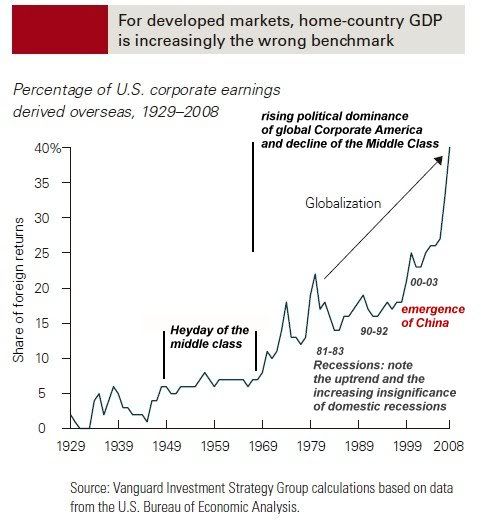
It's no longer the view only of a cranky fringe. Longstanding patriotic conditioning is giving way to a dry-eyed, realistic assessment of a country that is becoming less of a country every day.
Third World America is here, now. What's left of the middle class is squeezed in a pincer movement: one one side, a federal government that believes it is entitled to regulate everything for the benefit of professional politicians, the permanent bureaucracy, and globalist corporations; on the other side, a campaign of population replacement.
In a guest post at Zero Hedge, a writer with the nom de blog Free Radical writes:
The first, most fundamental, and most necessary step in the transition to a free society is the demise of the modern “monster state.” And the first, most fundamental, and most necessary step in this process is the demise of the monstrous American state, its erstwhile role as a beacon to the world having long ago given way to a superpower that brings not light but heat, pulling a shroud over its own people in the process. ...
It is increasingly clear, moreover, that the American welfare-warfare state is on its last legs and that its use of the present crisis to extend its reach both at home and abroad is an act of desperation, its towering inferno of debt being inextinguishable for the simple reason that desperation is what fuels it.
The United States Government isn’t fighting fire with fire, in other words; the American Empire is setting the world aflame with domestic overindulgence and foreign overextension, the difference being that it won’t merely become the latest victim of “imperial overstretch”; instead, it will become the last victim, its collapse igniting a worldwide devolution of power the likes of which the world has never known. For while it might be assumed that Russia or China will rush in to fill the resulting power vacuum, it is far more likely that the collapse of the American Empire will precipitate a worldwide devolution revolution that no state – least of all the “monster states” – will be able to withstand, as emboldened bodies politic and sympathetic international spectators frustrate central government efforts to suppress secessionist uprisings.
Devolution of nations and empires looks to be very much part of our Zeitgeist. The Soviet Union was the first, but certainly not the last, to crack. Then it was Yugoslavia's turn. Czechoslovakia is now divided into the Czech Republic and Slovakia. Quebec is Canadian in name only. Scotland is distancing itself from the U.K. and has its own parliament. Do you really believe no such thing could ever happen in the un-United States?
It's significant that some state politicians, such as the governor of Wisconsin and many attorneys general, have decided it is politically beneficial to themselves to challenge the Washington Politburo.
It's significant that some state politicians, such as the governor of Wisconsin and many attorneys general, have decided it is politically beneficial to themselves to challenge the Washington Politburo.
Free Radical again:
No matter that their central government no longer recognizes this principle, the fact is that is no law against – i.e., no Constitutional prohibition of – secession. On the contrary, "The procedure for joining the Union also applied to withdrawing from the Union. And the Tenth Amendment, which reserved to the states powers not delegated to the federal government, would seem to put the matter of secession with the states and the people."
So, too, would the fact that the delegations of three states, in ratifying the Constitution, specifically reserved not only each state’s right to withdraw from the Union but the people’s right to do so. For example, "The People of Virginia declare and make known that the powers granted under the Constitution being derived from the People of the United States may be resumed by them whosoever the same shall be perverted to their injury or oppression … ."
Talking about secession of states, groups of states, or parts of states is not a counsel of defeat for traditionalist conservatism. It's a sensible strategy in a "country" that is permanently divided about basic values and being infused with large-scale Third World immigration to prevent any effective counter-force to Washington's lords, according to the age-old principle of "divide and conquer."
The Leftist Establishment gleefully insists that we can't turn back the clock, that statism and multi-culturalism are now a fait accompli. They are partly right. There can never again be a United States with reasonably congruent values from sea to shining sea.
But while much has been lost, much remains. There is a substantial bloc of conservative Americans who want limited government, an end to mass immigration, and a constitutional republic. As long as they spend their political capital trying to "convince" the other side of their beliefs, though, they are wasting their time. The Left's long march through the institutions and its helping hand to reconquista have seen off any possibility of reunification.
I've said it before and I'll say it again: We need a constitutional amendment spelling out how legal, peaceful secession can take place. How can such an amendment (written very carefully to prohibit judicial nullification) create any problem? If, as some people insist, secession is impractical or impossible, then the issue will never arise and separation per the amendment will not happen.
The alternative is to carry on, for a while, as a house divided against itself, with parts of the country eventually going their own way regardless. And then a federal attempt to suppress them, quite possibly giving the world a picture much like that of the Soviets sending their armies and tanks into Budapest and Prague.
Free Radical believes the response won't get to that point, or it if it does, it won't work: "Imagine the spectacle, say, of a few thousand secessionists gathered in the same nonviolent civil disobedience that Gandhi, following Thoreau, used to liquefy the British Empire, to say nothing of the media onslaught that brought down the monstrous Mubarak regime in a matter of days. That is, imagine U.S. Government troops rolling in and dragging off American citizens, each clutching a copy of the Declaration of Independence, with cable news, Google, Facebook, and Twitter providing real-time worldwide coverage. Can one possibly believe that in light of such a blatant act of hypocrisy the American state could weather the resultant loss of whatever moral authority it still pretended to have?"
American history leaves no doubt that the Constitution was meant to create an association of states bound together for protection and trade, not an empire ruled by caesars and apparatchiks from Washington. That a mentally ill president in the 1860s was willing to send more than half a million Americans to their graves for "the Union" did not create a morally binding precedent. Let us do what is needed to insure that no one must ever again be prosecuted or killed for the crime of living in a republic rather than a centralized soft dictatorship.

















